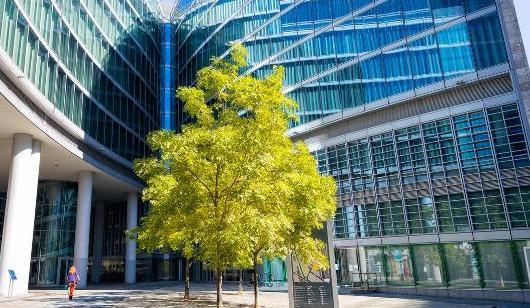- Friday 13 November 2020
In a world recovering from a prolonged period of collective trauma, the temptation to ‘let loose’ is balanced by a desire to make meaningful difference. In this article I present the opinion that, for investors, going green offers the best combination of both.
INTRODUCTION
In our fully connected world, we know that single individuals, events and movements can suck up all of the oxygen of global public & political discourse. In the case of war and pandemics, this attention is justified, the seriousness of the issue warranting our focus in an ongoing, if exhausting, manner.
However situations also arise that, in hindsight, are ridiculous in terms of the bandwidth they receive.
Brexit will undoubtedly be seen in time, if not already, as an entirely manufactured and pointless exercise in wasted resources, time and focus. Similarly, we hope, the once-off, four-year debacle of the Trump presidency will be written off in much the same manner.
FORCED PERSPECTIVE?
For long-term investors, as opposed to opportunistic traders, these events impact both markets and our resolve. While we know that the effect of most profound global calamities is smoothed over time – the most favored graph of the passive investor is the 100 year chart – perspective is difficult when you are ‘in the trenches’. So we learn, or are taught, to either shut the noise out completely or take action.
Fundamentally, the absolute best option for a long term investor is to do nothing. This is something I’ve discussed before and there is no shortage of data showing the benefits of sitting tight. But psychologically, taking action feels better. Having control of some part of our life is as much an emotional crutch as it is a financial decision.

.png)
An investment advisor once told me ‘A dip becomes a blip in time’
OPPORTUNITY COST IN SOCIETY
The price of proactive & ‘protective’ actions is called Opportunity Cost, the gap between what we could have earned/done/learned if things had been different or we had done nothing, and where we actually ended up.
In the case of Brexit, the real damage done to economies, communities and lives has yet to be calculated, same with the Trump experiment since 2016. Would our lives have been that bit less anxious these last four years if neither had happened? Almost certainly. And, alas, if we had taken decisive action in January 2020 to prevent the spread of Coronavirus, what would the world be like today?
I know. This is the worst type of ‘what-iffery ‘, trying to put a Sliding Doors system into a universe that doesn’t work like that. While it can be an interesting thought experiment to wonder what could have happened differently, it doesn’t have much use in the aftermath of what did happen. Instead, we make do and ‘make up’ for what we think we lost.
IRRATIONAL EXUBERANCE AND THE 'NEVER AGAIN' RESOLUTION
The ‘roaring twenties’, the ‘baby boomer’ generation and indeed the last decade are periods that immediately followed collective global traumas. During these times, temporary exuberance in terms of society and economies are common, when pent up frustration is unleashed over a short time.
This week, when news of the Pfizer vaccine was announced, two connected items drew my attention. The first was that Ryanair and Aer Lingus experienced their busiest online activity in years, as thousands of people took the opportunity to book flights that they still can’t be sure are going to happen. The second was that markets had one of the biggest one-day gains in recent memory, with investors jumping in on retail, travel and hospitality stocks while also dumping telecommunications like Zoom.
While it is assumed that the immediate outlook for a post-vaccine & post-Trump world will be positive, as pent-up economic activity is unleashed, this is by no means certain. If it does happen, my hope is that we manage to combine an attitude of reflexive decadence with a genuine desire to start implementing real-world change and betterment.
DON'T FORGET THE REAL ISSUE
Somehow, the surreality of the Brexit/Trump shows and the real-life trauma of Covid-19 pushed the even more dangerous, pressing & existential issues facing our globe out of mind this last year. However it doesn’t change the fact that Climate Change remains the most profoundly significant happening of our existence and, for those of us who are passionate about this issue, the relative lack of true engagement reflected in the priorities of government, society or markets is deeply frustrating.
I believe this is about to change. The election of Biden/Harris in the US puts adults back in charge of the worlds largest economy. With vaccine(s) in the pipeline for distribution in the coming months, the world will start turning again. These outcomes warrant acknowledgement, celebration and acceptance, but my hope is that, quickly, the task of dealing with climate change becomes ‘our’ highest priority again.
CAN MARKETS MAKE A DIFFERENCE?
Investors face a similar paradigm shift. This last year has seen Covid-influenced investors pour money into the tiny number of companies, mostly big-tech and telecommunications, who could thrive in a lockdown world. As we approach 2021 and a ‘return to normal’, are they still be viewed as the only suitable home for the billions of euro invested in them? Last weeks hammering of the Zoom share price says not.
Nature and markets hate a vacuum, and into this void we await the next big thing. While internet and social media business dominated the 2010’s, history tells us that appetites and markets change rapidly when they need to. With the exception of Tesla, no other company in the ‘Clean Tech’ space has global recognition today, but over the next decade it is almost inevitable that they will replace the FAANGs, as they replaced the Banks who replaced the dot.coms, who replaced the global aristocrats like Coke & McDonalds, and so on.
MAKING MONEY BY DOING THE RIGHT THING
What excites me most is that, finally, we might actually find a synergy of capitalism and global advancement, where the former finances and subsequently benefits from the latter. Of course companies need customers, and this is where the commitments of governments to protect this planet at all cost creates the incentive we need. Joe Biden has made climate change a top priority of his administration, so we should expect investment markets to follow.
HOW DO YOU INVEST IN ESG?
Private & institutional investors have a role here. At the moment, ESG Funds don’t really know what they are. Based mostly on ‘omission’ criteria rather than a meaningful mandate to make our lives better, they rely on the theory of ‘least worst’ rather than best. Oil companies who go paperless in their offices are deemed appropriate companies, while Green-Wrapping is put around the same tired old funds.
There are exceptions. Some fund managers and advisory firms, like Curran Futures, have a clear objective to invest in businesses with a materially proactive approach to preventing climate change, either in terms of service or product. Our focus is on the areas of Clean-Tech, Clean-Energy and Clean-Water, and while we cannot guarantee the success of every company in the funds we use, they are large and diverse enough to absorb the volatility that comes with a new venture.
This week, we got a view of what normal might look like in the coming years. It won’t be perfect but, hopefully, better than what we’ve all gone through. As markets readjust, a new industry is ready to take over from the incumbents and usher in a period of positive returns for investors and positive impact on our globe.
The Curran Futures Innovate Green ESG Fund’ is available for pension and savings investors. Our Portfolio Analyst, Gary Browne, recently published very interesting performance charts showing how a proactive ESG fund can outperform or ‘Sustainable’ investments, as well as the market in general. See the data here
Speak to us today about incorporating it into your investment strategy.




